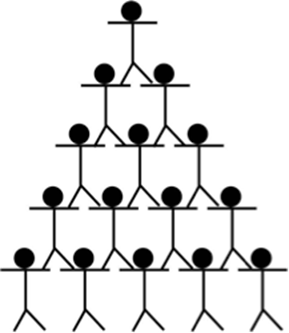Why Teleprospectors Hate Their Jobs, Part IV
- The persona development process should include internal and external data sources
- A persona echo chamber is created when internal beliefs about the target buyer are perpetuated
- Undocumented persona knowledge often resides in different groups or individuals within a company
Try this experiment: Have a quick look at the org chart graphic below. Now think for a moment about the teleprospecting or inside sales role in your organization. Where would you place that role in the org chart?
 If you put it at or very near the bottom of the chart, you’re in good company. That is how most people see the role. Now think about what we ask that role to do:
If you put it at or very near the bottom of the chart, you’re in good company. That is how most people see the role. Now think about what we ask that role to do:
- Create first impressions and lasting relationships with potential new customers.
- Assess and qualify new prospects for their value as potential new customers.
- Supply expensive (and high-status) salespeople with prospects worthy of their time and energy.
If first impressions really do matter, and if we really do care about the money we’ve spent in attracting potential new customers to our organization in the first place, then it seems we should accord the people we entrust with this role a bit more respect. However, there are more and even better reasons to elevate the status of teleprospectors.
Why elevate teleprospector status?
As I have written in previous posts, we make the role of the teleprospector unrewarding in a variety of ways, from ignoring their work output and measuring pure activity instead of contribution, to paying for outcomes over which teleprospectors have little or no control. Here’s another way we diss the role: in the vast majority of B2B companies I speak with, the teleprospector role is positioned purely as a stepping stone to some other, (unsaid but strongly implied) better, more important role. And while some roles must be at the entry level in an organization, no role should be treated as a mere stepping stone. To do so invites occupants of those roles to 1) do just what is necessary to get by and 2) to seek opportunities elsewhere as early and often as possible.
You don’t need to take my word for it. There is a massive volume of research literature from the fields of social psychology, sociology and political science that attests to the importance of social status as a driver of human behavior. From Maslow to his successors, experts in human behavior have long talked about the importance of social status. But if you don’t like those more academic approaches, you need only consider the economy. Consider the billions of dollars that are spent each year on “status-enhancing” products – often at the cost of crippling debt. The concern for how we are perceived by others is a powerful and universal driver of human economic behavior.
So, what has that got to do with teleprospecting? It’s simple: When teleprospectors (or anyone else) feel as though they are not valued for their contribution, their contribution declines. If you expect teleprospectors to make an important contribution to the organization, you must recognize that contribution and create opportunities for elevated status within the role itself.
How to elevate productivity by elevating teleprospector status:
- Thank them.
- Measure and recognize teleprospectors for their contributions to the business, rather than for how many times they press buttons on keypads. Not dials, but sales qualified leads. Not talk time, but genuine dialogues.
- Listen to calls. Recognize, measure and reward teleprospectors for the quality of the conversations they are having with prospects. When teleprospectors know that what matters most is the content of their calls, they will also know that what they do matters.
- Treat every lead produced like the gold that it is. Get status from sales on every lead. If you ignore most of their work product, they will know that most of their work product doesn’t matter.
- Recognize and reward achievement in the role. Unless you are able to promote all your best reps as soon as they demonstrate their excellence, you need to create a way for strong performers to understand their value in the current role. So, celebrate stars while they are still in the role. Create meaningful pay and status grades within the role. Put their pictures on the wall.
- Systematically involve top teleprospectors in conversations about messaging and product. They talk to more prospects than anyone else. Find out what they know.
All of the above suggestions will both improve the engagement and tenure of teleprospectors but they are also smart things to do on their own merit.